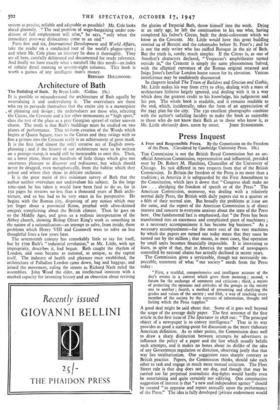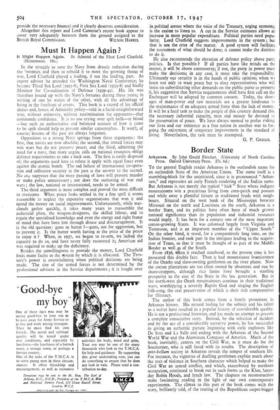Press Inquest
THE Commission is not the British Royal Commission but an un- official American Commission, representative and influential, presided over by Dr. Robert M. Hutchins, Chancellor of the University of Chicago. Its task differed in two respects from that of the British Commission. In Britain the freedom of the Press is no more than a tradition ; in America it is safeguarded by the First Amendment to the Constitution, which lays it down that "Congress shall make no law . . . abridging the freedom of speech or of the Press." The American Commission, moreover, was dealing with a relatively normal daily Press, the British with daily papers cut to a quarter or a fifth of their normal size. But broadly the problems at issue are the same, and the report of the American Commission is of direct interest and concern to everyone anxious about the state of the Press here. One fundamental fact is emphasised, that "the Press has been transformed into an enormous and complicated piece of machinery ; as a necessary accompaniment it has become big business." As a necessary accompaniment—for the mere cost of the vast machines by which the papers are turned out today mean that they must be turned out by the million ; that means, in most cases, that operation by small units becomes financially impossible. It is interesting to learn, in spite of that, that in America the number of newspapers controlled by national chains has actually declined in recent years.
The Commission gives a serviceable, though not necessarily im- peccable, statement of what "our society" needs from the Press today :
"First, a truthful, comprehensive and intelligent account of the day's events in a context which gives them meaning ; second, a forum for the exchange of comment and criticism ; third, a means of projecting the opinions and attitudes of the groups in the society one to another ; fourth, a method of presenting and clarifying the grades and values of the society ; and fifth, a way of reaching every member of the society by the currents of information, thought and feeling which the Press supplies."
A good deal might be said about that. Some of it goes well beyond the scope of the average daily paper. The first sentence of the first article in the first issue of The Spectator in 1828 ran : "The principal object of a newspaper is to convey intelligence." That in its way provides as good a staiting-point for discussion as the more elaborate American definition. As to other points, the Commission does well to draw a sharp distinction between attempts by advertisers to influence the policy of a paper and the fate which usually befalls such attempts, and it makes no bones about its dislike of the idea of any Government regulation or direction, observing justly that that way lies totalitarianism. One suggestion runs sharply contrary to British practice. Papers, the Commission thinks, should take each other to task and engage in much more mutual criticism. The Fleet Street rule is that dog does not eat dog, and though that may be carried too far perpetual journalistic dog-fights would hardly even be entertaining and quite certainly not edifying. One constructive suggestion of interest is that "a new and independent agency" should be created "to appraise and report annually upon the performance of the Press." The idea is fully developed (private endowment would
provide the necessary finance) and it clearly deserves consideration. Altogether this report and Lord Camrose's recent book appear to cover very adequately between them the ground assigned to the



































 Previous page
Previous page